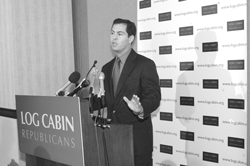“We reached a point in the gay and lesbian civil rights movement where we need to expect more than mediocrity from the people we support. That was a threshold for us,” said Patrick C. Guerriero, president of the national Log Cabin Republicans, in explaining the group’s decision in 2004 not to endorse the re-election of President George W. Bush. “It actually sent an important message to our Democratic friends. Don’t you think we ought to expect something from the people our Democratic and left-leaning groups support?”
The comment encapsulates the rationale that Guerriero, the nation’s leading gay Republican, puts forward for his organization—that Log Cabin is making important strides among Republicans and in red state America generally, even as it has proven willing to dissent within its party, while gay Democrats have not always demonstrated the same moxie in criticizing shortcomings in their candidates.
Guerriero, who is based in Washington, offered this asessment in a wide-ranging, 90-minute interview with Gay City News in New York on December 29.
Guerriero explained that Bush’s decision to make a federal anti-gay marriage amendment a centerpiece of his 2004 campaign—which he attributed to the president’s political guru Karl Rove—was critical in the Log Cabin decision not to endorse him, announced right after the Republican National Convention early last September.
“There is a price to be paid in Washington when you don’t endorse an incumbent president,” he said.” But looking back on history, we felt there needed to be some stakes in the ground and we felt as an organization that we needed to say, ‘Enough is enough. You can’t have our support on Election Day. It isn’t automatic.’”
The tough stand against a sitting president is part of what Guerriero described in a November appearance in New York as an emerging “civil war” in the Republican Party, between “pro-environment, pro-choice, Main Street Republicans” and “theocrats.” In the interview, he said, “Our best friends have been muted because of the avalanche of the marriage debate which nobody, including the LGBT community, was prepared for.” While noting that he ran as a pro-choice Republican during his time as an elected official in Massachusetts, Guerriero said that Log Cabin has no formal position on abortion rights. He pointed out that the choice and environmental organizations with which his group works in coalition take no position on gay marriage.
Guerriero specifically cited the debates over gay rights and the Terri Schiavo case as illustrative of the divide in the GOP.
“There were Republicans who were throwing out some of the basic reasons we became Republicans,” he said in reference to the Schiavo matter, before also touching on gay marriage. “Federalism—this whole idea that there would be a federal constitutional amendment runs counter to federalism. Two, this notion of big brother government getting into personal decisions, the Schiavo case being a very extreme window into that. Frankly it was creepy to a lot of good Republicans.”
Coalitions with choice and environmental groups and hot button issues like the Schiavo matter represent an evolution in Log Cabin strategy. So too is a stronger focus on transgender rights that Guerriero has introduced in Log Cabin since he took over in 2002.
“I have actually brought a level of discussion of that issue to the organization over the past couple of years,” he explained, saying that Mara Keisling, executive director of the National Center for Transgender Equality, has served as “a personal mentor” to him.
“I think we need us all to move forward and we should be wary of leaving anyone behind,” Guerriero said.
Addressing the fallout from Log Cabin’s endorsement decision last year, Guerriero acknowledged it hurt the group’s relationship with “the White House in terms of direct communications,” even while emphasizing that Log Cabin continues to meet with administration and West Wing policy makers on issues including Social Security reform and HIV/ AIDS.
Asked to assess the impact of the group’s non-endorsement on last year’s election results, Guerriero said that while the consensus view on the 2000 race was that a quarter of the gay vote went to Bush, figures from the Los Angeles Times and CNN put that number in 2004 at between 18 and 23 percent. And, given the rallying around the president in the wake of 9/11, Bush could have achieved 35 percent or more of the gay vote in 2004, but for the push for a marriage amendment, said Guerriero, who declined to parse the issue of whether Log Cabin led the debate or was simply another voice in a larger shift away from the president.
Guerriero was emphatic in emphasizing that his group’s standing in the Republican Party overall was not diminished at all by the endorsement move.
“Where there hasn’t been a price at all is in Washington as a whole in terms of Capitol Hill,” he said. “I think our relationship with Republican senators and representatives and governors is better than it ever has been. Part of it was because we showed that we are a formidable organization. We can go on television. We can raise money to make a conservative case basically defending against attacks on gay and lesbian Americans,” in a specific reference to the group’s nearly $1 million campaign against the marriage amendment in 2004.
In fact, Log Cabin’s ability to make a conservative argument on behalf of gay rights is central to Guerriero’s vision for why his group is uniquely positioned to help advance the community’s agenda. When Log Cabin sits down with administration officials to press for reauthorization of the Ryan White AIDS CARE Act or to argue that Social Security reform must include the rights of gay and lesbian Americans to include their partners as beneficiaries, he said that “a lot of times we’re the only LGBT group at the table.”
One issue that Log Cabin believes it can help decide is the ongoing campaign against the military’s Don’t Ask, Don’t Tell policy. Noting that politicians are way behind the public on this issue, Guerriero said, “It’s going to be a Nixon goes to China thing. Ultimately, it will take a veteran who is respected by the military… Some of our greatest champions on this might surprise people over the next five years—a group of GOP senators with military credentials. And that group that may include [Nebraska’s] Chuck Hagel and others who are not there yet but may be willing to take another look.”
His work, however, is not solely, or even primarily, focused in Washington, Guerriero said, noting that his organization has more chapters nationwide—over 90 are listed on its Web site—than any other LGBT organization. Log Cabin, he said, is situated to change “hearts and minds in red states.”
“The reality is that the history and the foundation of the LGBT movement has been largely fueled by the progressive base and by courageous Democrats who broke through within one political party,” Guerriero said. “That’s wonderful and it got us to the 20-yard line. My vision for the Log Cabin was that I look at this as a community bipartisan effort. To get us into the end zone, it’s going to require the courageous young lesbian in Kentucky meeting with her city councilor or the young Republican to come out in Nebraska.”
Still, there is a legal distinction between the national organization and the local chapters, and the Washington office focuses its political spending on federal office holders. To date, PAC spending by Log Cabin has been modest, ranging from $20,000 to $40,000 per cycle. In tandem with local chapters and individual donors, however, Guerriero estimated that the total giving attributable to Log Cabin efforts is more than $250,000 each year.
“Giving in Republican circles, quite frankly, it’s been easier to, in some way politically safe to give individually rather than as gay money over the years,” he explained, adding that recipients were well aware that they were Log Cabin donations either way. Guerriero, however, is looking to consolidate individual donations into the national and local PACS, hoping to have at least $100,000 each year for federal races alone.
Guerriero consistently emphasizes the selective nature of that giving. At the November appearance in New York, he said, “Log Cabin does not write blank checks to the GOP, because we don’t want even one dollar to fall into the hands of Rick Santorum,” the stridently anti-gay Pennsylvania senator who faces stiff competition in this year’s election from Democratic state Treasurer Bob Casey, the son of the late former governor, Robert P. Casey. Guerriero said that in last year’s congressional elections, the group gave money to less than 40 candidates.
The Log Cabin leader said that on the House side, there are between 35 and 40 Republicans—out of 220—who are “with us on most issues.” That includes 30 members of the GOP who voted early in December to support a federal hate crimes bill that included protections for transgendered Americans as well as gays and lesbians. On the Senate side, 12 Republicans out of 55 either cast a procedural vote or expressed sentiment opposing the Federal Marriage Amendment in 2004. A total of 18 have voted in favor of hate crimes legislation.
One Capitol Hill friend Guerriero is particularly concerned about this year is Rhode Island Senator Lincoln Chafee, who along with Massachusetts Democrat Ted Kennedy, is one of the only two senators who support gay marriage rights. Chafee’s posture as a Republican moderate has earned him a primary challenge in this year’s race.
In last year’s election, opposition to the FMA was the threshold for Log Cabin support, though Guerriero conceded that a pro-amendment legislator, such as Oregon Senator Gordon Smith next up for reelection in 2008, might merit support based on his strong advocacy for hate crimes and anti-discrimination legislation.
Clearly, then, just like their Democratic counterparts, Log Cabin will compromise on principles that in other cases are hard and fast. In fact, Guerriero talked about the importance of “incrementalism” when he addressed what could be a very tricky endorsement question—on the re-election effort by Arnold Schwarzenegger this coming November. The generally gay-friendly Republican incumbent, who earlier this year nonetheless vetoed the first gay marriage law passed by a state legislature, will almost certainly face a Democrat who promises to sign that bill.
Guerriero would not say exactly what his group would do in the race, emphasizing that Log Cabin is more focused on beating back an anti-gay marriage amendment that could go before California voters as early as this November or in 2008.
“We need the governor to come out against the anti-gay ballot question there or all of this would be irrelevant—and I think we can get him there,” Guerriero said.
He said that no other governor in the nation supports gay marriage rights, and that Schwarzenegger has supported the community on issues ranging from domestic partnership to a hate crimes measure than includes protections for transgendered Californians.
“So to hold Governor Schwarzenegger to a higher standard than other governors is, I think, unfair,” said Guerriero, who did not address the fact that California’s governor in 2007 might have another crack at a gay marriage bill. He did, however, make an argument about the value of having Schwarzenegger in office should a do-or-die constitutional amendment be on the ballot in 2008.
“I actually think that Schwarzenegger’s ability to come at this from a different place than a traditional Democrat is a powerful tool for the community,” he said.
Incrementalism is also key to Guerriero’s view of the 2008 presidential sweepstakes. He mentioned Hagel, former New York Mayor Rudy Giuliani, Arizona Senator John McCain, and former Homeland Security Secretary Tom Ridge, an ex-Pennsylvania governor, as “folks that don’t fit the cookie cutter of the extremist anti-gay groups.”
Asked whose candidacy would concern him, Guerriero responded, “My job is work with all of them,” before citing several problematic candidates, including Massachusetts’ Mitt Romney, a strident opponent of gay marriage in that state.
On the matter of 2008, Guerriero warned the community against an obsession with what he called “the theater of presidential politics.”
“I think we had a dream in the ’90s of a magical president who in that sense was named Clinton [who] would come in and we would pass these sweeping new laws and the whole country would move in our direction and it didn’t happen,” he said. “And the reality of that is that it is never going to happen that way.”
At the interview’s conclusion, Guerriero talked about something he saw as much more germane to the struggle.
“The closet is no longer a neutral place,” he said. “I’ve actually never quite put it in those terms before. The closet is no longer a neutral place when gay and lesbian families are under attack and that’s an interesting challenge for Democrats and Republicans, for people in power, for people in Washington.”
Distancing himself from what he called the “vengeance” of outing, Guerrero instead focused on what he termed “positive energy.”
“Part of my increasing goal next year other than protecting our friends is to try to help move closeted gay and lesbian Americans to come out,” he said.
Patrick Guerriero, in a recent appearance before the Washington media, talked strategy in an interview last week with Gay City News.
gaycitynews.com



































